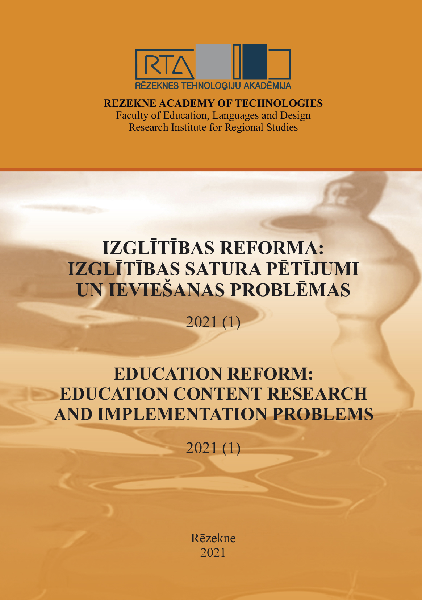LEARNING FOR GENDER EQUALITY IN POST-INDUSTRIAL ECONOMY: AN ONLINE PROGRAM OVERVIEW
DOI:
https://doi.org/10.17770/er2021.1.5417Keywords:
collaborative online program, digitalization, gender equality, digital empowerment, labour marketAbstract
The Latvian – Ukrainian project "Gender aspects of digital readiness and development of human capital in region" Nr.LV-UA/2018/3 focuses on the digitalization of education for closing the gender employment gap in the profoundly transforming labour market.
The article focuses on the online program "Learning for Gender Equality in Post-Industrial Economy" for professional development of educators. The program grounds on research previously done at the project. In this article, we review the program content and provide an evaluation of its participants.
References
Blayone, T. & van Oostveen, R. (2021). Prepared for work in Industry 4.0? Modelling the target activity system and five dimensions of worker readiness. International Journal of Computer Integrated Manufacturing, 34(1), 1-19.
DOI:https://doi.org/10.1080/0951192X.2020.1836677
Blayone, T. J., Mykhailenko, O., Usca, S., Abuze, A., Romanets, I., & Oleksiiv, M. (2020). Exploring technology attitudes and personal–cultural orientations as student readiness factors for digitalised work. Higher Education, Skills and Work-Based Learning. DOI: https://doi.org/10.1108/HESWBL-03-2020-0041
Blayone, T., van Oostveen, R., Barber, W., DiGiuseppe, M., & Childs, E. (2017). Democratizing digital learning: Theorizing the Fully Online Learning Community model. International Journal of Educational Technology in Higher Education, 14(13), 1-16. DOI: https://doi.org/10.1186/s41239-017-0051-4
Blayone, T., Mykhailenko, O., van Oostveen, R., & Barber, W. (2017). Ready for digital learning? A mixed-methods exploration of surveyed technology competencies and authentic performance activity. Education and Information Technologies, 23(3), 1377-1402. DOI: https://doi.org/10.1007/s10639-017-9662-6
Garrison, D.R. (2009). Communities of Inquiry in Online Learning. Canada: Universiy of Calgary. DOI: 10.4018/978-1-60566-198-8.ch052
Garrison, D.R. & Akyol, Z. (2013). The Community of Inquiry Theoretical Framework. Retrieved from https://www.researchgate.net/publication/284306348_The_ Community_of_Inquiry_Theoretical_Framework
Marzano, G. & Lubkina, V. (2019). The Digital Gender Divide: an Overview. Society. Integration. Education. Proceedings of International Scientific conference, Volume V, 413-421. DOI: 10.17770/sie2019vol5.3849
Mykhailenko, O. et al. (2020). Optimism, interest and opportunity: Comparing attitudes of university students in Latvia and Ukraine toward IT learning and work. Compare: A Journal of Comparative and International Education. doi:https://doi.org/10.1080/ 03057925.2020.1843999
Mykhailenko, O., Blayone, T.J.B., Usca, S., Kvasovskii, O., & Desyatnik, O. (2020). Optimism, interest and opportunity: Comparing attitudes of university students in Latvia and Ukraine toward IT learning and work. Compare. A Journal of Comparative and International Education. DOI: https://doi.org/10.1080/03057925.2020
Robeyns, I. (2006). Three models of education: Rights, capabilities and human capital. Theory and Research in Education 4(1). DOI: https://doi.org/10.1177/1477878506060683
Stefanova Ratcheva, V. & Leopold, T. (2018). 5 things to know about the future of jobs. World Economic Forum. Retrieved from https://www.weforum.org/agenda/2018/09/future-of-jobs-2018-things-to-know/
Žogla, I., Ušča, S., & Kijaško, M. (2019). Focus on Curriculum Transformation Through Educator and Student Attitude Development to Digital Competence. ATEE Spring Conference Proceedings Innovation, Technologies and Research in Education, 82-99. DOI: https://doi.org/10.22364/atee.2019.itre






